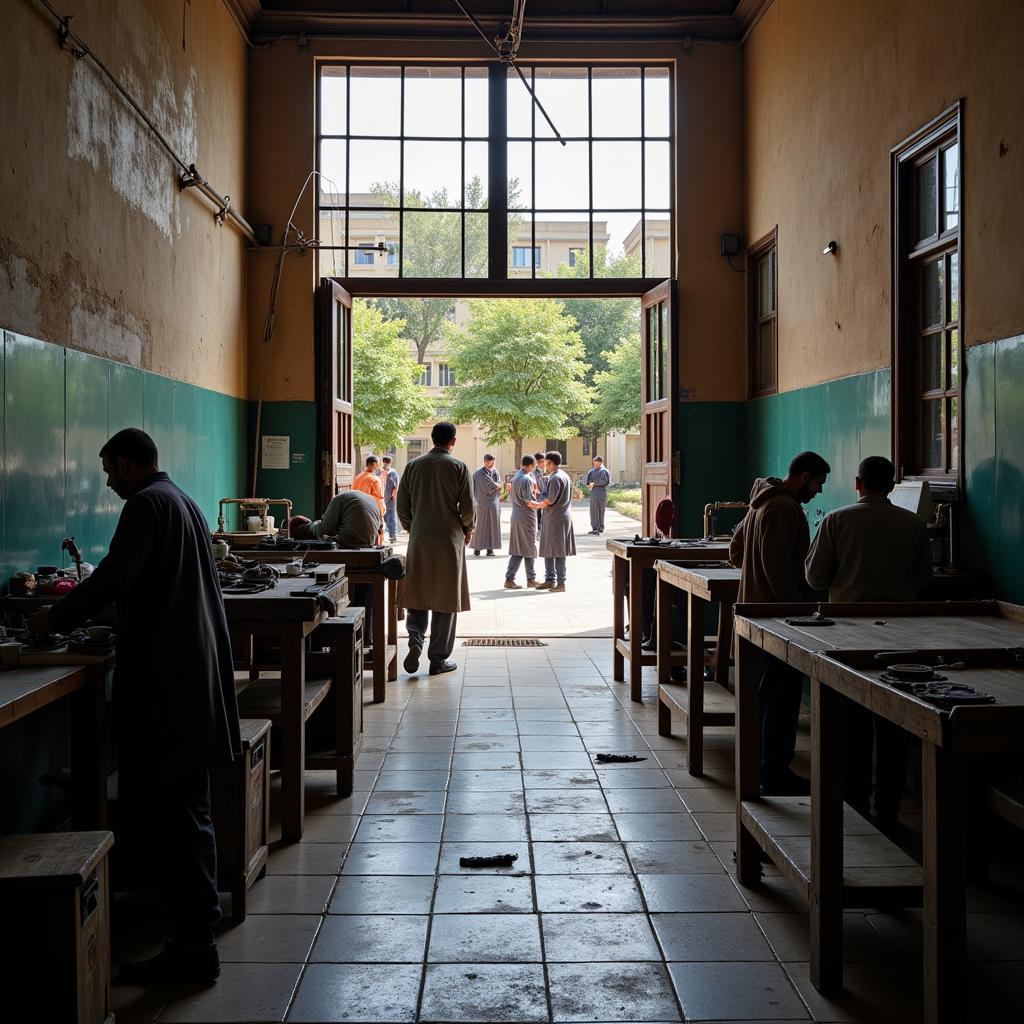Pakistan Prison Rules are a complex and often misunderstood aspect of the country’s legal system. This article aims to provide a comprehensive overview of these regulations, shedding light on the rights and responsibilities of inmates, the daily life within prison walls, and the legal framework governing the system.
Decoding the Prison Act of 1894: The Foundation of Pakistan Prison Rules
The cornerstone of Pakistan’s prison system is the Prison Act of 1894, a colonial-era legislation that still forms the basis of current practices. While amendments and supplementary regulations have been introduced over the years, this act lays out the fundamental structure for prison administration, inmate rights, disciplinary procedures, and parole conditions. Understanding this act is crucial for comprehending the complexities of pakistan prison rules.
Key Provisions of the Prison Act 1894
The act covers a wide range of aspects, including the classification of prisoners, regulations regarding food and clothing, provisions for medical care, and rules for visitation. It also outlines disciplinary measures for infractions within the prison and the process for appealing such decisions. A critical aspect of the act is its focus on the separation of different categories of prisoners, such as undertrials, convicts, and those based on gender and age.
Daily Life Inside Pakistani Prisons: A Glimpse Behind Bars
Life inside a Pakistani prison is often harsh and challenging. Overcrowding, inadequate sanitation, and limited access to basic necessities are common problems. Inmates follow a strict daily routine, which includes designated times for meals, work, and limited recreational activities. Communication with the outside world is restricted, with limited access to phone calls and letters.
Challenges and Concerns within the System
The Pakistani prison system faces numerous challenges, including resource constraints, corruption, and human rights concerns. There are ongoing debates regarding the effectiveness of rehabilitation programs and the need for reforms to address issues such as overcrowding and the treatment of vulnerable prisoners.
 Daily Life Within Pakistani Prisons
Daily Life Within Pakistani Prisons
Rights of Prisoners under Pakistan Prison Rules: Ensuring Basic Human Dignity
While imprisoned, individuals retain certain fundamental rights under pakistan prison rules. These include the right to adequate food, clothing, medical care, and legal representation. They also have the right to communicate with family and legal counsel, and to file complaints regarding their treatment.
Access to Legal Aid and Representation
Ensuring access to legal aid is a crucial aspect of prisoner rights. Many inmates cannot afford legal representation, and organizations providing pro bono services play a vital role in ensuring they receive a fair trial and are not unjustly detained. Navigating the legal system can be particularly challenging for vulnerable populations, and access to legal aid is often the only recourse they have. Driving rules in Pakistan, while seemingly unrelated, highlight the importance of clear regulations and legal representation within a structured system. Similar principles apply to the rights and legal processes within the prison system.
Rehabilitation and Reintegration: Preparing for Life After Prison
Rehabilitation programs aim to equip inmates with the skills and support necessary to reintegrate into society upon release. These programs can include vocational training, educational opportunities, and counseling services. The effectiveness of these programs, however, is often hampered by limited resources and a lack of comprehensive support systems post-release.
The importance of clear legal frameworks extends to various aspects of life, from child protection laws in Pakistan to corporate law in Pakistan. These regulations, like pakistan prison rules, aim to maintain order and protect individuals within specific contexts. Even seemingly unrelated areas like obtaining a fishing license in Pakistan demonstrate the importance of adhering to established rules and regulations.
Conclusion: The Future of Pakistan Prison Rules
Pakistan prison rules are a complex and evolving set of regulations. While the system faces significant challenges, ongoing efforts to reform and improve conditions are crucial for upholding human rights and ensuring a just and humane correctional system. Understanding these rules is essential for anyone concerned with the legal and social landscape of Pakistan.
FAQs about Pakistan Prison Rules
- What is the main legislation governing Pakistan’s prisons? (The Prison Act of 1894)
- Do prisoners have any rights in Pakistan? (Yes, they have basic human rights like access to food, clothing, medical care and legal representation)
- What are the main challenges facing the Pakistani prison system? (Overcrowding, inadequate resources, and human rights concerns)
- What kind of rehabilitation programs are available in Pakistani prisons? (Vocational training, education, and counseling)
- How can I get more information about a specific prison in Pakistan? (Contact the provincial prison authorities)
- Are there any organizations that provide legal aid to prisoners in Pakistan? (Yes, several NGOs offer pro bono services)
- What is the process for visiting a prisoner in Pakistan? (You need to obtain permission from the prison authorities and follow specific procedures)
For further reading, you might find articles related to child protection laws in Pakistan and corporate law in Pakistan relevant.
Need help understanding Pakistan prison rules or other related legal matters? Contact us at +923337849799, email news.pakit@gmail.com, or visit our office at Dera Ghazi Khan Rd, Rakhni, Barkhan, Balochistan, Pakistan. Our team is available 24/7 to assist you.